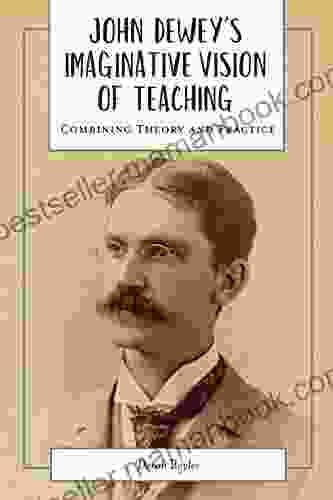John Dewey's Imaginative Vision of Teaching: Nurturing Creativity and Critical Thinking in Education

5 out of 5
| Language | : | English |
| File size | : | 689 KB |
| Text-to-Speech | : | Enabled |
| Enhanced typesetting | : | Enabled |
| Word Wise | : | Enabled |
| Print length | : | 233 pages |
| Screen Reader | : | Supported |
John Dewey, a prominent American philosopher and educational reformer, propounded an imaginative vision of teaching that underscores the significance of nurturing creativity and critical thinking in learners. Dewey believed that education should be a dynamic and engaging process that fosters the development of the whole child, not merely imparting knowledge but also equipping them with the skills and dispositions necessary to navigate a rapidly changing world.
Dewey's Philosophy of Education
Dewey's philosophy of education is rooted in the principles of pragmatism, which emphasizes the importance of experience and the practical application of knowledge. He believed that students should actively engage with their learning and that the curriculum should be relevant to their lives and experiences.
Dewey's key principles of education include:
- Learning by ng: Dewey believed that students learn best through hands-on experiences and by actively engaging with the material. He advocated for experiential learning, where students could apply their knowledge in real-world situations.
- Critical thinking: Dewey emphasized the importance of critical thinking and problem-solving skills. He believed that students should be able to analyze information, evaluate evidence, and form their own s.
- Creativity: Dewey recognized the value of creativity and imagination in learning. He encouraged students to explore their creative abilities and to express themselves in a variety of ways.
- Student-centered learning: Dewey believed that the student should be at the center of the learning process. He advocated for a student-centered approach to teaching, where students have a voice in their own education and are actively involved in their learning.
- Constructivism: Dewey's philosophy of education aligns with the constructivist theory of learning, which posits that learners actively construct their own understanding of the world through their experiences and interactions.
Implications for Teaching Practice
Dewey's philosophy of education has profound implications for teaching practice. Teachers who embrace Dewey's principles focus on creating learning experiences that are:
- Engaging and relevant: Lessons are designed to be interesting and meaningful to students, connecting to their prior knowledge and experiences.
- Inquiry-based: Students are encouraged to ask questions, investigate problems, and explore different perspectives.
- Hands-on and experiential: Learning activities involve students in active exploration and experimentation, allowing them to apply knowledge in practical ways.
- Collaborative: Students work together in groups to share ideas, solve problems, and learn from each other.
- Student-centered: Teachers facilitate learning, provide guidance, and support students in their learning journeys, empowering students to take ownership of their education.
Benefits of Dewey's Vision
Dewey's imaginative vision of teaching has numerous benefits for students, including:
- Enhanced creativity and imagination: By encouraging students to explore their creativity, teachers foster their ability to think outside the box and generate innovative solutions.
- Improved critical thinking and problem-solving skills: Through inquiry-based learning and hands-on activities, students develop their analytical and problem-solving abilities, preparing them to tackle complex challenges.
- Increased motivation and engagement: When students are actively involved in their learning and see the relevance of the material, they become more motivated and engaged in the learning process.
- Holistic development: Dewey's approach to education promotes the development of the whole child, nurturing not only academic skills but also social, emotional, and creative abilities.
John Dewey's imaginative vision of teaching provides a compelling framework for educators who seek to nurture creativity and critical thinking in their students. By embracing Dewey's principles of experiential learning, critical thinking, creativity, student-centered learning, and constructivism, teachers can create learning environments that empower students to become lifelong learners, problem-solvers, and engaged citizens in a rapidly evolving world.
5 out of 5
| Language | : | English |
| File size | : | 689 KB |
| Text-to-Speech | : | Enabled |
| Enhanced typesetting | : | Enabled |
| Word Wise | : | Enabled |
| Print length | : | 233 pages |
| Screen Reader | : | Supported |
Do you want to contribute by writing guest posts on this blog?
Please contact us and send us a resume of previous articles that you have written.
 Top Book
Top Book Novel
Novel Fiction
Fiction Nonfiction
Nonfiction Literature
Literature Paperback
Paperback Hardcover
Hardcover E-book
E-book Audiobook
Audiobook Bestseller
Bestseller Classic
Classic Mystery
Mystery Thriller
Thriller Romance
Romance Fantasy
Fantasy Science Fiction
Science Fiction Biography
Biography Memoir
Memoir Autobiography
Autobiography Poetry
Poetry Drama
Drama Historical Fiction
Historical Fiction Self-help
Self-help Young Adult
Young Adult Childrens Books
Childrens Books Graphic Novel
Graphic Novel Anthology
Anthology Series
Series Encyclopedia
Encyclopedia Reference
Reference Guidebook
Guidebook Textbook
Textbook Workbook
Workbook Journal
Journal Diary
Diary Manuscript
Manuscript Folio
Folio Pulp Fiction
Pulp Fiction Short Stories
Short Stories Fairy Tales
Fairy Tales Fables
Fables Mythology
Mythology Philosophy
Philosophy Religion
Religion Spirituality
Spirituality Essays
Essays Critique
Critique Commentary
Commentary Glossary
Glossary Bibliography
Bibliography Index
Index Table of Contents
Table of Contents Preface
Preface Introduction
Introduction Foreword
Foreword Afterword
Afterword Appendices
Appendices Annotations
Annotations Footnotes
Footnotes Epilogue
Epilogue Prologue
Prologue Mary Kennedy
Mary Kennedy Liz Moody
Liz Moody Matteo Sedazzari
Matteo Sedazzari Meredith Summers
Meredith Summers Chris Quintana
Chris Quintana Sandra Chinazo Nwankwo
Sandra Chinazo Nwankwo Felix Oberman
Felix Oberman Jamez Wigginz
Jamez Wigginz Sophia Ava Turner
Sophia Ava Turner William Kent Krueger
William Kent Krueger Marv Wolfman
Marv Wolfman Dana Sachs
Dana Sachs Kevin D Hoover
Kevin D Hoover Andres Angulo Minota
Andres Angulo Minota Barrie A Wigmore
Barrie A Wigmore Marcus Youssef
Marcus Youssef Lanjing Zhou
Lanjing Zhou Emery Leeann
Emery Leeann Jerry Lindberg
Jerry Lindberg Tino Hemmann
Tino Hemmann
Light bulbAdvertise smarter! Our strategic ad space ensures maximum exposure. Reserve your spot today!

 Milan KunderaPhoenix: The Zach Kryton Introductory - A Thrilling New Superhero for a New...
Milan KunderaPhoenix: The Zach Kryton Introductory - A Thrilling New Superhero for a New...
 Miguel de CervantesThere Buffalo In That Tree: An Unforgettable Wildlife Encounter in the...
Miguel de CervantesThere Buffalo In That Tree: An Unforgettable Wildlife Encounter in the... Ivan TurnerFollow ·7.5k
Ivan TurnerFollow ·7.5k Dan BellFollow ·10.1k
Dan BellFollow ·10.1k Jared NelsonFollow ·15.5k
Jared NelsonFollow ·15.5k Scott ParkerFollow ·9.5k
Scott ParkerFollow ·9.5k Albert ReedFollow ·18.1k
Albert ReedFollow ·18.1k Billy PetersonFollow ·17.2k
Billy PetersonFollow ·17.2k Joshua ReedFollow ·16k
Joshua ReedFollow ·16k Colby CoxFollow ·10k
Colby CoxFollow ·10k

 David Foster Wallace
David Foster WallaceA Comprehensive Journey Through Economic Thought: A Brief...
Economics, the study of...

 Phil Foster
Phil FosterRecipes for Two: Nourish Your Body, Nourish Your...
Cooking and sharing meals together is one of...

 Alexandre Dumas
Alexandre DumasThe Ultimate Monkey Hat: Emery Leeann
If you're an animal lover,...

 Chadwick Powell
Chadwick PowellThe Breakbeat Poets Vol. 4: Black Girl Magic - Unveiling...
In the realm of...

 Dan Brown
Dan BrownAn Emotional and Touching Love Story: A Journey of Love,...
This is a love story that will stay with you...
5 out of 5
| Language | : | English |
| File size | : | 689 KB |
| Text-to-Speech | : | Enabled |
| Enhanced typesetting | : | Enabled |
| Word Wise | : | Enabled |
| Print length | : | 233 pages |
| Screen Reader | : | Supported |










